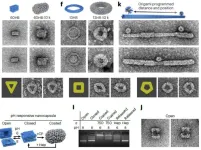(Press-News.org) As the world's population continues to grow, ensuring access to clean and safe water has become an increasingly important concern, yet little is known about how surface water quality will change in the future. Recent scientific research has shed light on the potential challenges that surface water quality may face in the coming years, particularly in Sub-Saharan Africa. “While surface water quality is projected to improve in most developed countries, there is an important caveat: the outlook for the poorest nations is bleak”.
A recent study, published in Nature Water, has projected an increase in surface water pollution in Sub-Saharan Africa. These findings highlight the need for proactive measures to protect surface water resources and safeguard the well-being of communities. The study, led by Utrecht University researcher Edward Jones, emphasizes the importance of equitable and sustainable development, particularly in regions expected to experience the greatest challenges. Using a new global model, he assessed how climate change and societal developments could impact surface water quality until the end of the century.
Key hotspot
“Irrespective of climate change and socio-economic scenario, there will be a strong increase in the number of people living in Sub-Saharan Africa who are exposed to poor surface water quality”, warns Jones. “This pattern is not systematically replicated in any other world region.” Even under the most optimistic future scenario the number of people exposed to pollutant concentrations exceedances in Sub-Saharan Africa will more than double. Alternatively, under pessimistic assumptions, the number of people exposed to poor surface water quality can increase 5-fold. “With the combination of strong water quality degradation and the drastic increases in the number of people exposed to poor surface water quality, our paper concludes that Sub-Saharan Africa will become the key hotspot of surface water pollution in the future.”
Challenges
The challenges are multifold, according to Jones. Waterborne diseases caused by pathogen-contaminated water can pose a significant risk to human populations. With a growing global population, the availability of good quality water for irrigation is of utmost importance. Additionally, energy production, which is key for global development, can be hampered by a combination of both low water levels and high water temperatures. Thus, the study highlights the importance of limiting both climate change and anthropogenic water pollution to safeguard both human livelihoods and ecosystem health in the future.
Article
Edward R. Jones, Marc F.P. Bierkens, Peter J.T.M. van Puijenbroek (...), Michelle T.H. van Vliet, ‘Sub-Saharan Africa will increasingly become the dominant hotspot of surface water pollution’, Nature Water, https://doi.org/10.1038/s44221-023-00105-5 (after lift of embargo)
END
Addressing the future challenges of global surface water quality
Sub-Saharan Africa as the key future hotspot
2023-07-17
ELSE PRESS RELEASES FROM THIS DATE:
Study finds how to reduce risk of kids playing with a found gun
2023-07-17
COLUMBUS, Ohio – In a lab at The Ohio State University masquerading as a playroom, pairs of kids ages 8 to 12 participating in a study found a variety of toys and games to play with – as well as a mysterious file cabinet.
Inside one of the drawers of the unlocked cabinet were two disabled 9-mm handguns.
As they played in the room, nearly all the children eventually found the guns. But some kids in the study were much more likely to tell an adult they found a gun, less likely to touch the gun, and were less reckless if they did touch it – and they were the kids who had watched a one-minute gun safety video a week earlier.
The study may be the ...
Trading sickness for health: Swapping brain cells points to new Huntington's therapies
2023-07-17
NNew research appearing in the journal Nature Biotechnology answers important questions about the viability of treatments that seek to replace diseased and aged cells in the central nervous system with healthy ones. Its findings have implications for a number of neurological and psychiatric disorders—including Huntington’s disease, amyotrophic lateral sclerosis (ALS), and schizophrenia—that have been linked to glia, a population of cells that support brain health and function.
“A broad variety of disorders we associate with neuronal loss now appear to be caused ...
Researchers craft ‘origami DNA’ to control virus assembly
2023-07-17
Griffith University researchers have played a key role in using DNA ‘origami’ templates to control the way viruses are assembled.
The global team behind the research, published in Nature Nanotechnology, developed a way to direct the assembly of virus capsids – the protein shell of viruses - at physiological conditions in a precise and programmable manner.
Dr Frank Sainsbury and Dr Donna McNeale from the Griffith Institute for Drug Discovery were part of the research team and said forcing viruses to assemble onto DNA folded into different shapes “like origami” was a question that this project answered.
“We achieved control over the virus protein ...
Cap top 20% of energy users to reduce carbon emissions
2023-07-17
Consumers in the richer, developed nations will have to accept restrictions on their energy use if international climate change targets are to be met, warn researchers.
The big challenge is to identify the fairest and most equitable way that governments can curtail energy use, a process known as energy demand reduction.
Writing in the journal Nature Energy, the research team - led by Milena Büchs, Professor of Sustainable Welfare at the University of Leeds - analysed several scenarios to identify a potential ...
Excess mortality with Alzheimer disease and related dementias as an underlying or contributing cause during pandemic
2023-07-17
About The Study: This study found that large increases in mortality with Alzheimer disease and related dementias as an underlying or contributing cause of death occurred in COVID-19 pandemic year 1 but were largely mitigated in pandemic year 2. The most pronounced declines were observed for deaths in nursing home/long-term care settings. Conversely, excess deaths at home and in medical facilities remained high in year 2.
Authors: M. Maria Glymour, Sc.D., of the Boston University School of Public Health ...
Comparison of history of present illness summaries generated by a chatbot and senior internal medicine residents
2023-07-17
About The Study: History of present illnesses generated by a chatbot or written by senior internal medicine residents were graded similarly by internal medicine attending physicians. These findings underscore the potential of chatbots to aid clinicians with medical documentation.
Authors: Ashwin Nayak, M.D., M.S., of Stanford University in Stanford, California, is the corresponding author.
To access the embargoed study: Visit our For The Media website at this link https://media.jamanetwork.com/
(doi:10.1001/jamainternmed.2023.2561)
Editor’s Note: Please see the article for additional information, including other authors, author contributions and affiliations, ...
Addressing adaptation inequalities in climate research
2023-07-17
A new study proposes ways to better incorporate adaptation in climate change research, addressing the uneven distribution of adaptation capacities and needs worldwide.
Research on adaptation to the risks posed by climate change has witnessed significant growth in the past decade, with increasing recognition of its urgency in policy agendas at the international, national, and local levels. Adaptation needs and capacities are not evenly distributed worldwide, with countries in the Global South generally experiencing the highest challenges. ...
Heading frequency and risk of cognitive impairment in retired male professional soccer players
2023-07-17
About The Study: The findings of this study suggest that repetitive heading during a professional soccer career is associated with an increased risk of cognitive impairment in later life. Further study is needed to establish the upper threshold for heading frequency to mitigate this risk.
Authors: Weiya Zhang, Ph.D., of the University of Nottingham in Nottingham, United Kingdom, is the corresponding author.
To access the embargoed study: Visit our For The Media website at this link https://media.jamanetwork.com/
(doi:10.1001/jamanetworkopen.2023.23822)
Editor’s Note: Please ...
COVID-19 vaccines saved dementia patients' lives in nursing homes
2023-07-17
Deaths among older adults with dementia fell starkly in nursing homes and long-term care centers after COVID-19 vaccinations became available, yet remained high for those living at home, according to a new study led by UC San Francisco.
The nationwide study published July 17, 2023 in JAMA Neurology, is the first to use data from 2019 to 2022 to quantify “excess” deaths – or those above what would have been anticipated had there been no pandemic – taking into account age, sex, racial and ethnic groups, as well as the settings where people died.
In the first year, there were 509,179 dementia-related ...
Reprogramming the shape of virus capsids could advance biomedicine
2023-07-17
Bioengineers have found a way to program the size and shape of virus particles by combining viral protein building blocks and templates made from DNA. The resulting nanostructures could have applications in vaccine development and transporting drugs inside the body.
Virus capsid proteins—the proteins that shield the genome of a virus—can be used to build precisely structured protein assemblies. Their shapes and geometry, however, depend largely on the virus strain. Reprogramming these assemblies, no matter the original ...
LAST 30 PRESS RELEASES:
Night lights can structure ecosystems
A parasitic origin for the ribosome?
A gold-standard survey of the American mood
Tool for identifying children at risk of speech disorders
How Japanese medical trainees view artificial intelligence in medicine
MambaAlign fusion framework for detecting defects missed by inspection systems
Children born with upper limb difference show the incredible adaptability of the young brain
How bacteria can reclaim lost energy, nutrients, and clean water from wastewater
Fast-paced lives demand faster vision: ecology shapes how “quickly” animals see time
Global warming and heat stress risk close in on the Tour de France
New technology reveals hidden DNA scaffolding built before life ‘switches on’
New study reveals early healthy eating shapes lifelong brain health
Trashing cancer’s ‘undruggable’ proteins
Industrial research labs were invented in Europe but made the U.S. a tech superpower
Enzymes work as Maxwell's demon by using memory stored as motion
Methane’s missing emissions: The underestimated impact of small sources
Beating cancer by eating cancer
How sleep disruption impairs social memory: Oxytocin circuits reveal mechanisms and therapeutic opportunities
Natural compound from pomegranate leaves disrupts disease-causing amyloid
A depression treatment that once took eight weeks may work just as well in one
New study calls for personalized, tiered approach to postpartum care
The hidden breath of cities: Why we need to look closer at public fountains
Rewetting peatlands could unlock more effective carbon removal using biochar
Microplastics discovered in prostate tumors
ACES marks 150 years of the Morrow Plots, our nation's oldest research field
Physicists open door to future, hyper-efficient ‘orbitronic’ devices
$80 million supports research into exceptional longevity
Why the planet doesn’t dry out together: scientists solve a global climate puzzle
Global greening: The Earth’s green wave is shifting
You don't need to be very altruistic to stop an epidemic
[Press-News.org] Addressing the future challenges of global surface water qualitySub-Saharan Africa as the key future hotspot

